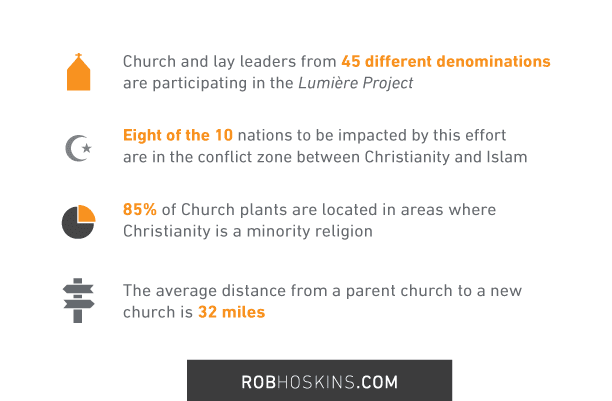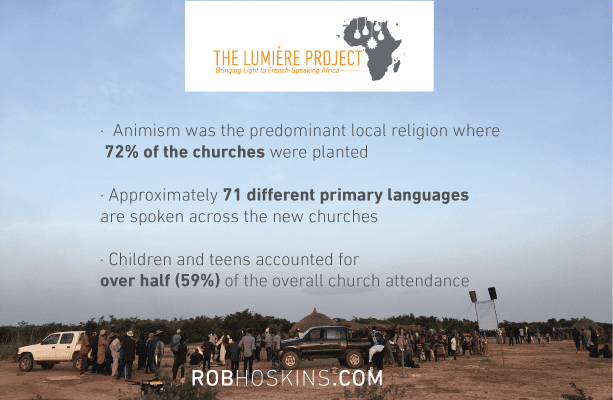Research is vital to our work at OneHope—it isn’t something we keep on the backburner or treat as an afterthought. It is a foundational and strategic component we embrace ministry wide.
First of all, research is revelatory. It helps give us a clear snapshot of the reality we must operate in. At OneHope, we began instituting research efforts to help us better understand our audience so that we could craft customized products and programs to meet the heartfelt needs of individuals in our pursuit of “God’s Word, Every Child.”
Second, research is one of the best catalysts for growth and success.
“What’s measured improves”
Peter Drucker
As new initiatives and programs are implemented, we periodically keep a pulse on them. Take, for instance, one of our global initiatives called the Lumière Project. The aim of this project is to take the light of Christ to French-speaking Africa with the goal of planting 3,300 churches in a 5-year timeframe.
You might be wondering why this massive project has such a short timeframe. Well, our research revealed that at the time, our window of opportunity was open, but we didn’t know for how long. French-speaking Africa is one of the last places on earth where open evangelism efforts can legally take place in the Muslim world.
The plan was simple; to plant churches starting with outreaches conducted using the animated story of Jesus, The GodMan film, and the God’s Big Story children’s program. Then continue to have locals who had attended these outreached continue to meet with a local layperson who was being trained up to be a pastor. Rinse and repeat.

Evaluating programs like this as they are piloted and as they grow is important because it not only provides accountability to our partners and those in the field, but it also helps OneHope steward our resources and efforts well. Without taking the time to survey and evaluate the success of your efforts, you cannot effectively gauge what needs to be improved in order to make a program more effective. The initial Launch Survey was completed right after a church was planted. It was then followed by the Initial Follow-up Survey and Final Follow-up Survey, each conducted 6 to 12 months apart.
Two years after the Lumière Project was launched, we took a look at the research to see how the project was progressing. Through the three evaluation periods, we were able to monitor the progress of the developing Lumière church plants, and document both successes and challenges. Take a look at some of these interesting facts we learned through our research just 2 years into the project:

More than 634 churches had been planted with a cumulative attendance of over 32,000 people. With such encouraging numbers, we continued to maximize our efforts on this initiative.
By having a clear glimpse into the reality of the church plants, we were able to better serve and equip our field partners, the dedicated and brave men and women who often sacrificed greatly to share the Good News in their region. Continued research and evaluation of this project were some of our best allies when it came to nurturing sustainable communities of faith.
More than 2,313,681 children and youth have been reached with God’s Word through the Lumière Project. More than 634 churches had been planted.
As of this writing, more than 2,313,681 children and youth have been reached with God’s Word through the Lumière Project. By faith, we are planning to reach 1,568,530 more in 2020.
Finally, research isn’t a destination you arrive at, it’s a journey you live by. The Scripture commands us to be fruitful and to judge according to fruit. Fruit is the observable result of health, the fulfillment of purpose, the actualization of potential. In the Bible, fruit represents results, evidence, legitimacy, and sustainability.
As leaders of the Church, too often we have asked far more of others than we ask of ourselves. We want effectiveness in how our children are taught in school, how our doctor prescribes medication, how our broker invests our portfolio, or how our mechanic repairs our vehicle. In all of these fields, effectiveness is a critical component of faithfulness.
In ministry, there cannot be faithfulness without the intelligent and intentional pursuit of fruitfulness. Though it is at times beyond our control, it is not beyond our responsibility—it is what moves us to prepare more carefully, to evaluate more consistently, to be more honest and thoughtful ministers of the gospel.
Colossians 3:23 says, “And whatever you do, do it heartily, as for the Lord and not for men.” This is why we make the effort – to glorify the Name Above All Names.
While the idea of doing or using research can feel weighty or overwhelming, I hope that debunking a few myths about research will help demystify the process for you.
Myth #1: Research tells you the truth
Research reports don’t give you big, mind-blowing conclusions. Instead, they provide a better understanding of the reality of your present circumstances. A good research report guides you on what some “good” or “not so good” next steps might be.
Pitfall to avoid: You will have to work to overcome “confirmation bias,” which is the natural human tendency to embrace information supporting your own beliefs while rejecting information that contradicts them.
Myth #2: Siri and Google have all the answers
It might be quick and easy to do a few quick searches on the internet to get started. However, you need to orient yourself by starting a thorough SEARCH of what’s currently out there concurrent/pursuant to your topic and situation. Once you have begun searching and figure out what problem you are actually trying to solve, you can see what (if any) information is missing and begin to RE-search.
Pitfall to avoid: Don’t begin searching for numbers and stats that “prove” your specific intentions. Instead, be open to discovering the truth of your situation, and be willing to pivot your original theory and course of action to suit your present reality.
Myth #3: I can throw together a quick survey
Posing a question sounds so simple. Sometimes it is, but without a tightly defined problem, posing the right question is impossible. In situations where there are thousands of possible answers out there, it’s critical to ask the right question.
Only after that initial search can we ask a good question and do a RE-search for any information that is missing. For example: when choosing the right diet, a good used car, or solving the issue of illiteracy in an identified region, a wonderfully designed research study with the most complex statistical analysis is rendered totally ineffective if we fail to ask the right questions.
Pitfall to avoid: Don’t hurry through the SEARCH phase or skip to the RE-SEARCH phase without knowing exactly what you are looking for. Otherwise, you risk asking the wrong question/s that will put you on a path you never intended…
Myth #4: Whether or not I like it, “the research” holds all the answers
No. Research won’t give you answers, it will offer a few suggestions for next steps. Research speaks in comparative language, not in definitives. It will not tell you, “Do this, but don’t do that.” What it will tell you is what might be more effective and what might be less effective, or what is probably going to be better for you to do, and what is worse. Research is neither conclusive nor prescriptive. It won’t answer your big, burning question with a definitive answer. It narrows and it suggests.
People often make one of two mistakes when judging the value of research.
Dismiss the research.
Believe it tells the whole story.
For instance: More often than not, single studies contradict one another — such as the research on foods that cause or prevent cancer. The truth can be found somewhere in the totality of the research, but we report on every study in isolation underneath flip-flopping headlines.
Pitfall to avoid: Don’t use research, statistics, and reports like a crystal ball. They will not predict the future. Don’t be played or paralyzed by research. You do just as much damage leaping after its “big conclusion” as you do failing to be agile enough to make small pivots based on its findings. It’s a tiny rudder that puts the ship on a better course.
Myth #5: Research is too lofty
Research, for all of the pomp and circumstance of its vocabulary, is quite a humble process. While its rigor makes it feel lofty, the reality is that research lends subtle, humble conclusions.
One of the best definitions of research I have come across recently that helps people see research as accessible and doable is:
“A creative process conducted in a systematic way to advance knowledge.”
Pitfall to avoid: Don’t be so scared of research that you fail to use it or do any at all.
Myth #6: Anyone can do it
People believe that they know way more than they actually do. Thanks to the internet, we all think we are expert researchers when we employ Google, Siri, or Alexa. While not all research is created equal, what you can control in doing your own research should be held to a level of effectiveness. It’s true that some research is better than none at all, but poor research, or conclusions applied ineffectively can cause great harm.
Pitfall to avoid: Beware the “illusion of explanatory depth.” You may have good research at hand, but you, or an expert, need to know how to evaluate and apply it correctly.
